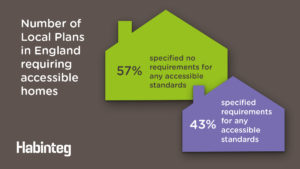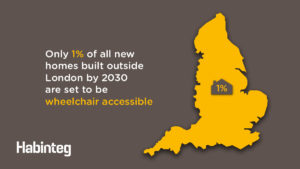Housing experts have warned of an ‘accessible homes crisis’ in England as new research reveals that less than a quarter of homes built outside London by 2030 will be suitable for older and disabled people.
Habinteg’s nationwide analysis of 322 local planning policies reveals an imminent crisis in the supply of all types of accessible homes:
- Outside London under a quarter (23%) of new homes due to be built by 2030 are planned to be accessible, negatively impacting on the health and independence of older and disabled people.
- Just 1% of homes outside London are set to be suitable for wheelchair users despite 1.2 million wheelchair users in the UK and a rapidly ageing population.
There is a postcode lottery in the supply of new accessible and adaptable homes:
- By 2030 there will only be one accessible new home built for every 270 people in the West Midlands, one accessible new home for every 52 people in the East of England, and one accessible new home for every 24 people in London.
- London bolsters the national forecast as the Greater London Authority require 90% of new homes to be built to accessible and adaptable standards (known as building regulations M4 category 2) and 10% to wheelchair accessible standards (known as Building regulations M4 category 3).
Habinteg Housing Association is calling on the Government to change national policy so that all new homes are built to be more accessible and adaptable, as they are in London.
Habinteg’s new Insight Report: A Forecast for Accessible Homes analyses English local plans which set policies for what types of homes are to be built by 2030 and where. There are 13.9 million disabled people in the UK yet just 7% of English homes currently provide even the most basic accessibility features. Unless new homes are suitable, older and disabled people will be excluded from aspects of daily life, placing increasing demand on public services.
Actress, Broadcaster and Habinteg tenant, Sam Renke said: “I constantly worry that if job opportunities come up in another area, I may have to turn them down because there’s not enough housing that’s accessible. As a full-time wheelchair user, moving to London and having a home that really works for me has been vital to my ability to develop my career. After a long time in unsuitable accommodation I’m in a wheelchair accessible home that meets my needs, but there is always a lingering anxiety about what may happen in the future.”
 Habinteg’s Chief Executive, Sheron Carter said: “We would encourage national government to take a more strategic approach to accessible homes delivery. The optional approach is not only putting older and disabled people’s health and independence at risk but creating costly housing problems for the future.
Habinteg’s Chief Executive, Sheron Carter said: “We would encourage national government to take a more strategic approach to accessible homes delivery. The optional approach is not only putting older and disabled people’s health and independence at risk but creating costly housing problems for the future.
While the Government has stated their ambition for getting more disabled people into work, our research shows that this will fail unless the housing crisis for disabled people is urgently tackled. We strongly urge the Government to raise the mandatory baseline standard for accessible homes.”
Responding to Habinteg’s accessible homes report, Local Government Association housing spokesman Cllr Martin Tett said: “Housing is critical to the wellbeing of individuals, and well-designed accessible homes are needed to meet the housing needs of our ageing population.
“Councils want to ensure the right homes are built in the right places but currently don’t have the powers or funding to build the homes that are desperately needed.
“We believe that new homes should be accessible or easily adaptable for people of all generations and needs, and it is vital the Government ensures national rules incentivise the building of accessible homes.
“Furthermore, it is crucial to acknowledge that the majority of people will live in existing housing. The Government needs to continue to invest in supporting the adaptation of homes to meet the needs of people as their circumstances change.”
 Habinteg is calling on the Government to:
Habinteg is calling on the Government to:
- Set the ‘accessible adaptable’ standard — M4(2) Category 2 as the new mandatory baseline, as it is in London.
- Ensure the Secretary of State for Homes, Communities & Local Government issues new guidance to local planning authorities on how they should reflect the housing needs of older and disabled people in their plans. This duty was set out in the Neighbourhood Planning Act 2017 but guidance has not yet been issued.
Habinteg also calling for local authorities to set a defined percentage of new homes as wheelchair accessible M4(3) Category 3.
To download a copy of the Insight Report: A Forecast for Accessible Homes report click here:









